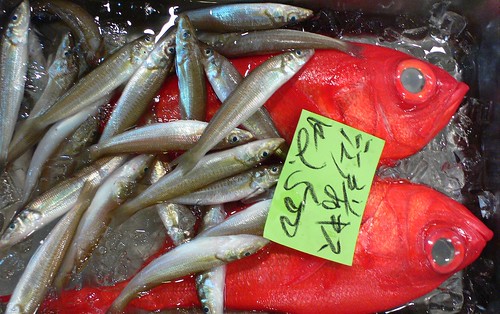 Japan’s government wants to stave off the country’s declining fish consumption by promoting boneless "fast fish" products that are easy to prepare. Traditionalists, in turn, are complaining about the microwavable products because it constitutes disrespect toward Japan’s fish food culture.
Japan’s government wants to stave off the country’s declining fish consumption by promoting boneless "fast fish" products that are easy to prepare. Traditionalists, in turn, are complaining about the microwavable products because it constitutes disrespect toward Japan’s fish food culture.The government’s initiative began in August with "boneless Pacific saury," told supermarket operator Aeon Co. Demand was high: the 400,000 packs sold out in less than two months, leading Aeon to expand production in Iwate Prefecture to keep up.
Kinzo Matsumoto, the general manager of Aeon's Seafood Department, explained that the products’ success is related to the advertising efforts tying fish with bread.
“As of late, we haven't had a new product with such sales growth," he stated, Asahi Shimbun reports.
Not only young but also elderly shoppers have become enthusiastic consumers of fast fish, Matsumoto told, because it is easy to eat. In mid-October, the Tokyo branch of Aeon Shinagawa Seaside offered 20 products, including vacuum-packed boneless saury and salmon, with flavours such as orange olive, garlic butter and "shiso."
According to the Fisheries Agency, the Japanese ate 20 per cent less fish on average in 2010 compared to 2009, instead opting increasingly for beef and pork. The Fisheries Agency has thus far approved 1,333 products, such as boiled mackerel that can be stored at room temperature for more than six months and microwaveable sauteed horse mackerel. They come with the Agency's seal of approval and often cost between USD 3.4 and USD 4.5.
"One thing about modern eating habits is that a product has to be quick to prepare,” Yutaka Arai, the head of the Fisheries Agency's Policy Planning Division, said. “We want people to have an easy way to enjoy lots of different flavors (of seafood) and find it 'surprisingly delicious.'"
Takeo Koizumi, a professor emeritus of food culture at the Tokyo University of Agriculture, said the “fast” aspect has become necessary to appeal to consumers who are turning away from fish.
Source: FIS.com
Photo courtesy of gruntzooki via Flickr (CC BY-SA 2.0)
